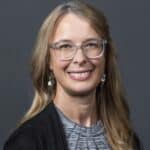Volume 38 Number 2 | April 2024
Stacy Walz, PhD, MLS(ASCP)

Enter: A mentor, the first of many; an internal medicine physician with whom the college freshman did some job shadowing over the summer, and the college freshman is made aware of the field of “medical technology” (this was the mid-1990s, after all). This mentor earned her undergraduate degree in (now) medical laboratory science and worked in the field for a few years before going off to medical school. She described the hands-on coursework, the clinical rotations, and the fascinating world of human health and disease; this was the first time that this college freshman heard details about the field and what it entailed. Sounded like a perfect fit for her!
Does this story sound familiar to anyone? That college freshman (a.k.a., me) did go on to complete a bachelor’s degree in MLS and loved every minute of it. Up until that mentor shared the field with me, I had no idea it existed as a career path. As a current MLS/MLT educator, I rarely encounter a student who knows about the field early in life without guidance or suggestion from a teacher, counselor, advisor, or family friend. There is almost always a pivotal conversation or experience that sparks curiosity, which leads me to the importance of mentors and mentorship in the field of MLS and its professional organization, ASCLS.
“Mentoring can lead to a multitude of incredible outcomes: promoting the field of CLS, helping students achieve educational goals, earning promotions or new jobs, demystifying membership in professional organizations, and improving work-life balance, just to name a few.”
The Miriam-Webster Dictionary defines mentor as “a trusted counselor or guide.” Many might only consider formal mentor-mentee relationships (as overseen by an employer or organization) as “true” mentorship, but I urge you to consider a broader, informal, on-going, and ubiquitous mentorship approach. To be transparent, I am sharing from personal experience and not delving into research or formal guidance from “experts” for these next few paragraphs. Let’s debunk some myths about mentorship.
Myth 1: I should only have one mentor at a time.
False. There are no “rules” about this. No one is going to prevent you from having multiple mentors at any given time. Some mentoring relationships may be ongoing and last many years, and others may be short-lived and specific. You might have multiple mentors at one time because each of them provides guidance for a different aspect of your life (e.g., professional, educational, personal). You’re even allowed to have multiple mentors for a single aspect of your life. As a mentor yourself, you are allowed to have multiple mentees and provide mentorship for multiple/different aspects of life (in other words, you don’t have to “specialize” in just one area, such as professional). Life ebbs and flows, and mentoring relationships can, too.
Myth 2: Mentorship is only for young people.
False. Certainly, young people (in high school or college) may have more questions as they explore the world and where they might best fit in it, but I think there is a role for mentorship in all stages of life. I urge you, in whatever role you’re in professionally, personally, or spiritually, to be observant of the people around you at work, school, home, church, gym, etc., regardless of age. You may discover someone 20 years your senior inquiring about a skill or trait you exercise in your workplace, or a peer who notices your wellness routine and asks you about it. I am not suggesting that you ignore opportunities to guide young people in their life journey or avoid answering questions posed by young people. I am suggesting that there is no age limit to being a mentor or a mentee, nor are there rules about which one of the people fulfilling each role should be older than the other.
Learn about opportunities to be a mentor or find a mentor with the ASCLS Mentorship Program.
Myth 3: Mentoring can only be for school and jobs.
False. Certainly, seeking out advice to help you get that promotion, or apply to graduate school, or decide on your undergraduate major, are all valid and common reasons why mentor-mentee relationships develop. But there are many other aspects of life for which mentorship can play a critical role in guidance. Some examples include establishing a worklife balance, parenthood, wellness practices, interpersonal relationships, and spirituality. All of those aspects are intricately intertwined in human beings when you think holistically—“big picture”—so there can be “ripple effects” of mentorship in one area that impact other areas.
Myth 4: One needs special skills or characteristics to be a mentor.
False. I would bet every single one of you reading this article right now is either an “accidental” or purposeful mentor. Have you ever invited a colleague to join you at an ASCLS event? You’re a mentor. Have you ever offered advice to someone in your family or friend circle about college or career-planning? You’re a mentor. Have you ever shown someone your time management technique or filing system you use in your role as a student, employee, or volunteer? You’re a mentor.
In summary, mentorship is critical to personal growth and development in many aspects of life. It’s especially important in clinical laboratory science, given the profession’s “invisibility” and a general lack of knowledge about it among members of the public. Mentoring relationships can (and should) happen any time, any place, with anyone! Mentoring can lead to a multitude of incredible outcomes: promoting the field of CLS, helping students achieve educational goals, earning promotions or new jobs, demystifying membership in professional organizations, and improving work-life balance, just to name a few. Be a mentor!
Stacy Walz is the Department Chair, Clinical Laboratory Sciences, at the College of Nursing and Health Professions at Arkansas State University in Jonesboro, Arkansas.